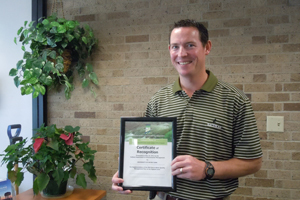
The University of Notre Dame recently received a Certificate of Recognition from the state of Indiana’s Department of Environmental Management (IDEM) for its storm water management program on campus.
Managing storm water and snowmelt is a critical environmental issue for the areas in and around campus. After a heavy rainfall, the water runoff flows over impervious surfaces (parking lots, roads and building rooftops) and accumulates debris, chemicals, sediment or other pollutants that can negatively affect the water quality of our lakes and streams.
Since 2003, IDEM has required sites that utilize conveyances for rainwater such as roads with drainage systems, municipal streets, curbs, gutters, ditches or storm drains to abide by six control measures: public education and outreach, public involvement, illicit discharge, construction run-off, post-construction run-off, and pollution prevention and good housekeeping.
Notre Dame’s Utilities Department has taken this regulation seriously and put into place several best management practices that make the most sense for campus grounds. Beyond complying with regulation, the University has made it a goal to improve storm water quality, minimize negative impacts on the area’s watershed and to ensure that future generations will have access to high quality water resources.
A few aspects of the campus storm water program that gave ND high marks include: unpaved Gameday parking on White Field allows for rainwater to percolate into the soil; central containment of hazardous waste to reduce potential for spills; and the use of organic fertilizer with low nitrogen and phosphorous. In addition, Innovation Park, a LEED certified building, diverts 100% of its storm water into a settlement basin.
“We’re happy the state was impressed by our program,” said Chip Farrell, Senior Environmental Specialist at the Utilities Department. “However, we’re always looking for ways to improve the program. This award has motivated us to expand our public education and outreach program. We’ll be partnering with the Office of Sustainability to help the Notre Dame community become more aware of storm water issues and what they can do to protect waterways.”